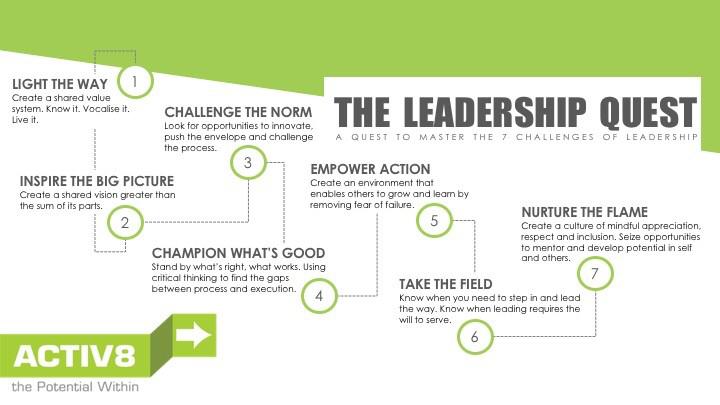TAKE THE FIELD Leading in the Time to Serve
March 17, 2020
Written by Mashal Peerzada

On the 17th of March, 2020 the Health Service Executive (HSE), Irelands health and social service provider, appealed to all non-working healthcare professionals to be “on call for Ireland”. Within three days of the HSE’s announcement, 50,000 former healthcare professionals registered, including Leo Varadkar, the Irish Prime Minister, who rejoined the country’s medical register and began working one shift a week as the country grappled with a growing COVID-19 outbreak. At Activ8, we often talk of leadership as an act of service. Our leadership framework, The Leadership Quest, talks of this specifically as the sixth challenge of leadership; ‘Take the Field’ – a time when leaders must demonstrate that they are willing not only to lead, but to serve. In a time when both the best and worst of global, corporate and community leadership has been laid bare, Varadkar’s actions stood out to us as both incredibly inspiring, and strategically masterful. For organizations both large and small, this kind of leadership act is perhaps most pertinent in today’s challenging circumstances. As the world passes through one of the most challenging times in recent history, a global pandemic that is straining health care systems, as well as supply lines; that has taken lives, shattered our daily reality, as governments close their borders, order quarantines and enact severe “social distancing” measures that are devastating retail businesses and markets alike – organizational leaders are forced to ask their teams to go above and beyond. To rise above personal stressors and emotional despair, to bank their fears and insecurity and to continue to serve the goals and visions of the organization. With continued economic uncertainty and global unemployment reaching an all-time high, employees feel the burden of this ask. They feel the pressure of performing from a place of fear. This kind of dysfunctional crisis thinking both adversely effects performance during difficult times, and sows the seeds for the kind of long-term cultural erosion that will make it increasingly difficult for organizations to engage and retain talent beyond the crisis. What an action like Varadkar’s does is the opposite, it asks not for more from the people, but inspires them to look within and ask themselves what more they could do. It amplifies the need of the hour and fosters a culture that allows individuals to rediscover their own value by creating opportunities to leverage long dormant skills, explore hidden talents and grow into new roles, all while building closer, more supportive and collaborative interpersonal relationships. It is essentially the difference between delivering from a place of fear, and performing together from a place of self-worth. Today, leadership has become a focal point of conversation, and to many, the key differentiator between organizations that will survive and those that will fail. If the COVID-19 pandemic has illuminated anything, it has thrown into sharp relief the failings of the social contract nations the world over have built with the poorest and most vulnerable segments of their societies. In developing countries like Pakistan, where these segments represent the largest percentage of our population, words alone are not enough to lead impactfully or create the kind of buy-in that will take others with you. For organizational leaders it is no different. At Activ8 we tend to talk about leadership as a role, not a designation. A part you play though your actions. Amidst the global narrative that we are ‘all in this together’ – the test of this moment for organizational heads is to play this role with two faces. The face of the captain and the face of the crewmate. While employees undoubtedly need the reassurance of strong vision and direction from the top, there is an increasing need for leaders to overcome the ‘us vs. them’ divide and demonstrate, as did Leo Varadkar, that they are willing not only to lead, but to serve. Leaders who are unwilling to share the burden of the moment and serve the demands of the time invariably run the risk of not only alienating their employees, but of seeing productivity, performance, and ultimately the bottom line suffer. Often times the term ‘taking the field’ is used synonymously with ‘leading from the front’. We look at it a little differently. To us, it is a matter of assessing the needs of the hour, determining what you can do to meet those needs and joining your skills and value to the effort. Beyond designation, hierarchy or ego. Taking the Field, the sixth challenge of leadership is in fact the highest act of humility and service to a cause that is greater than yourself.